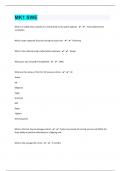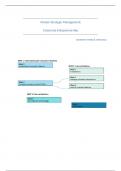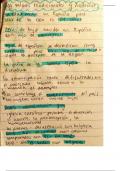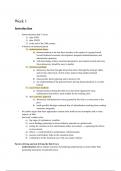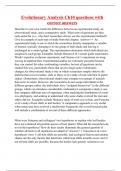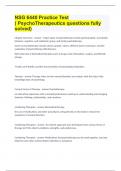UNIT 4 Assignment B: A report into synthesising Nail varnish
Remover.
Introduction.
What is ethyl ethanoate and how is it made and purity tested
industrially?
Ethyl ethanoate is a common and useful product this means that
large amounts of this are normally made in the industry. Ester is an
organic compound made by replacing the hydrogen of an acid with
an alkyl or other organic group. This is the product of the
condensation reaction between the alcohol and the carboxylic acid.
This means ethyl ethanoate is one organic compound and is mainly
used as a solvent in different reactions. This is made by a reaction
between ethanol and ethanoic acid. Concentrated sulphuric acid is
used as a catalyst this is because the reaction is slow and reversible.
CH3COOH+C2H5OH=CH3COOC2H5+H2O. During the practical, we
will measure the boiling point of the product to then determine the
purity of ethyl ethanoate. In the industry, there are many ways of
testing the substance for example Infrared microscopy, thin layer
chromatography (TLC). This can be to test the purity and the boiling
point of ethyl ethanoate.
How is ethyl ethanoate made in the industry/commercially?
In the esterification process, a mixture of acetic acid and ethanol
with a small amount of sulphuric acid is preheated and provide in an
esterifying column where it is refluxed. The mixture removed goes to
a second refluxing column where a ternary azeotrope containing 85%
ethyl acetate is removed. Water is then mixed with the distillate
after which it separates into two layers. The top layer is fed to a
,refluxing column from which the residue containing 95% ethyl
acetate is distilled to remove any impurities.
Commercially, Ethyl acetate is made from 10% acetic acid quick
vinegar process and 50% alcohol high wines this is by a distillation
process. A ternary mixture of ethyl acetate, water, and ethyl alcohol
distils first. Chemistry/ethyl-acetate- (commercially made)
Keywords
Definition of Esterification-
This is a reaction of an alcohol with an acid to produce an ester and
water.
Definition of Catalyst-
This is a substance that increases the rate of a chemical reaction
without itself undergoing any permanent chemical change.
(www.icis.com) (Manufacturing and production process) 13/10/2020
Here is an image of the structure of Ethyl Ethanoate.
https://accuform-img3.akamaized.net/files/damObject/Image/
huge/PPE_Main.jpg 02/10/2020
This is the equation for making ethyl ethanoate from ethanol and
ethanoic acid. CH3COOH+C2H5OH=CH3COOC2H5+H2O.
Here are two methods of making Ethyl ethanoate in the industry.
Method 1
Tishchenko reaction.
, This is a disproportionation reaction of ethanol, the aldehyde is
reduced and oxidised at the same time. The conditions of the
reaction are 0-5 degrees Celsius this is in the presence of aluminum
alcoholate as a catalyst. There is a high conversion of ethanol this is
up to 98% into the ester ethyl ethanoate this as a result gives a high
yield. (Hartley, J et al 2016)
(Hartley, J et al 2016)
Method 2
This process may be a batch process or a continuous process. Water
formed in the reaction is removed by distillation. It is vital to
achieving the maximum conversion of ethanoic acid which is costlier
than ethanol. The conversions reactants in this process are
approximately 95%. The batch procedure involves a single reactor
that is filled with ethanoic acid and ethanol. The catalyst Sulphuric
acid is added and the water is removed as the reaction continues.
This method can be used to make large quantities of esters. This also
means that the batch process requires reactors that hold extremely
large volumes of reactants. Heating coils are used to heat the
reactants.
The continuous process for making esters is used to manufacture
large quantities of esters. This includes the mixing of streams of
reactants into the reaction chamber while the product is being
removed at the same time. Continuous esterification has many



